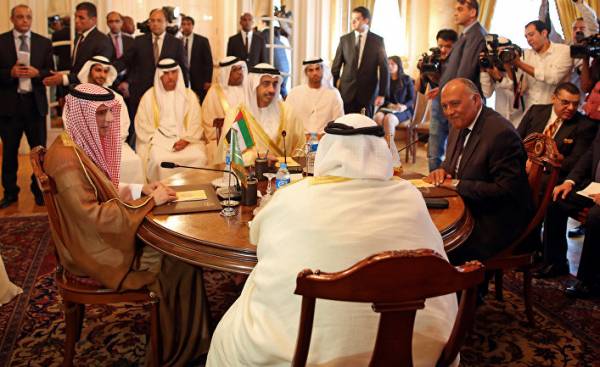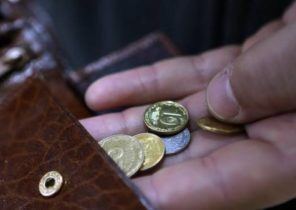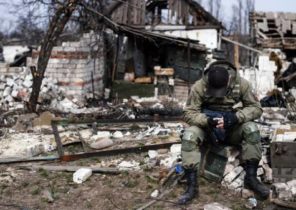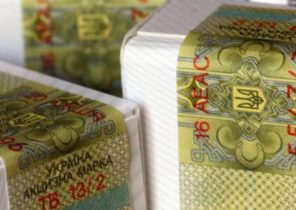
Boycotting Qatar, the country has not yet moved on to tougher sanctions. But the decision is not planned, the conflict will escalate. As a result, the parties themselves harm.
Relief after three days of intense Shuttle diplomacy in the Persian Gulf was noticeable by Sigmar Gabriel. The meeting of foreign Ministers of the four boycotting States that on Wednesday evening in Cairo failed to agree on toughening sanctions against Qatar, said the Minister of foreign Affairs of Germany after his return to Berlin, although it was not a breakthrough, but the result was achieved, which is at least not further complicate the process. Now we need real negotiations of all parties.
That is, apparently, a lull before the storm. Because Saudi Arabia, UAE, Bahrain and Egypt have already agreed on the next meeting in Bahrain’s capital Manama, date not yet determined. At the meeting, the countries plan to agree on tougher measures against Qatar, which is accused of financing terrorism, interference in internal Affairs, promotion with TV channel Al Jazeera, as well as allied relations with the enemy Iran. June 5, they try to isolate Qatar with closing borders and economic constraints.
Short-term containment blockade of Qatar is associated only with two people, but it will not last long. Because the Arab neighbors who like to call themselves “brothers” of Qatar, a rebel, as a small country on the Peninsula, located in front of Saudi Arabia in the Persian Gulf, is not inferior to a millimeter. If they accept this situation and not respond with more stringent measures, it will lose face — especially the new crown Prince of Saudi Arabia Muhammad Ibn Salman. He wants to carry out radical reforms in the country and with the help of hard-line foreign policy, as in Yemen and in Qatar, to deflect criticism of conservatives in connection with the weakening of the status of rules within the country.
That came a respite, due, of course, with Sigmar Gabriel. Although officially he does not want to take on a mediating function, however, it was her he was doing among all those present. They know that he maintains close contact with U.S. Secretary of state Rex Tillerson and the EU, and there is little understand of the blockade measures, but are increasingly expressing distrust towards Saudi Arabia because the country itself supports the extremists.
First, however, we are talking about Donald trump. His foreign policy since taking office sharply criticized. And in respect to this crisis. First, it supports the blockade front, accusing Qatar, of course, via Twitter, the financing of terrorism. Then he lets his Secretary Rex Tillerson to prevent diplomatic discord, when closed diplomatic missions, border, resettle thousands of people blocked funds in banks. The dispute the parties to the conflict have to decide for yourself.
It was not until such time as the trump Wednesday called the head of Egypt Abdel-Fattah al-Sisi and said the conflict must be completed. At the very least, should not be followed by tougher sanctions.
The US interest is clear — they have in Qatar your command center on the Middle East. Bahrain hosted the regional naval forces. In all the affected countries Washington has a large military presence. When trump USA I want to play the role of power, defender of the Persian Gulf. And first of all America out there wants to sell weapons — it is clear that due to the slogan “America first” and for the sake of creating jobs.
However, in diplomatic circles is called the other less worthy motives — the build-up of arms on all sides could lead to such a serious conflict that may need additional or backup supplies. Or Washington will put under the knife of Saudi Arabia with its excessive ambitions — to result in myself to take control of the most important oil country in the world and to eliminate a competitor of the American energy economy.
The conspiracy theorists, of course, adhere to this position. But if you look objectively, Washington is not interested in the destruction of the Gulf countries. This would strengthen only the position of sworn enemy, Iran, will lead to a new confrontation, instability, escalation of wars in Syria, Yemen and other places and, of course, to the rise in oil prices. On the one hand, good for facingaway industry of the United States, which at current oil prices stalled, however, weakens the economy as a whole.
You can start a new vicious circle — lack of investment of the Gulf countries in the oil and gas economy, limited resources, price increases, economic crisis does not have to taste such a businessman like trump, when he would look at the situation from the height of his tower.
For the economy, including German, have already started a crisis can have bad consequences. But it is not about the existing consequences. Although right now there is an increase in the prices of air and Maritime transport and increase in travel time for regional managers. However, a much more dangerous due to blockade Qatar the destruction of the dream of a rich, growing, stable community of Nations of the Persian Gulf. Saudi Arabia was responsible for the production of oil, Qatar for LNG exports, and has invested billions in the construction of new cities and the world Cup of football in 2022, UAE — the giant of the airline industry, and the Dubai port of Jebel Ali — the largest hub of the world.
With the closure of the Jebel Ali for Qatari supplies and confiscation destined for Qatar cargo Dubai himself had a disservice. UAE are no longer a reliable partner. Will decrease their role of mediator and hub. However, not only for Qatar, which now finds itself a solution, organizing deliveries through Iran, Oman and a private port facility, primarily due to expansion in Saudi Arabia. There are reform of the crown Prince comes up with his own entertainment and tourist industry and, above all, logistics chain with the railroad, connecting the West and East, and mega ports. As a result, the routes are Dubai and Doha.
Due to this, the current crisis can only be a harbinger of what will replace Arab brotherhood as a result of competition, rivalry and selfishness.
However, Saudi Arabia is a big risk not only in rivalry with small neighbors. Much more serious problems are expected in the Eastern provinces of the country in the absence of the Qatari market. Already in the province, where in the depths of the desert are the main sources of oil, the largest oil company Saudi Aramco has an office in Daman, the expected conflict. The region is inhabited by mainly Arab Shiites — a minority compared to Sunni Muslims in the country.
Now out of the Qatari market in the amount of two million consumers. Huge farm set in the neighbouring country from the region, milk, meat poultry and other products supplied by Qatar cement factories and construction companies. The closure of the border will destroy this market. Milk Qatar now buy in Turkey, vegetables and fruits in Iran, and construction materials in India. Who wants to achieve these measures, change in the political course of Qatar, must sacrifice, said a senior Riyadh.
That is, in the end, all parties are hurting themselves. The tale “one Thousand and one nights” about the fantastic growth of the glittering metropolis of Dubai, Doha competitor, the dreams of reformers in Riyadh and the development of Abu Dhabi will become a reality if the region will remain stable. If foreign investors can rely on the treaties to open markets and integration of the countries of the Persian Gulf and, above all, themselves Arab investors. The blockade had already led to the displacement of bilingual families (for example, when the husband — Saud, wife of the Qatar and they have children that now I can not live either in Doha or Jeddah). Or those who can no longer visit their factories, stores or sales branches.
In addition, you may experience a new “Arab revolt” — new protests in the countries where the origins of the “Arab spring”. In Morocco, Tunisia and Iraq, where in 2011, was ousted from power management, have once again started to protest people. Although Saudi Arabia and the UAE have supported the new military leaders in Cairo and the king of Morocco, providing billions of dollars in aid, and private citizens have provided jobs and state subsidies.
However, in Egypt, the money went rather irrational plans such as new construction in the capital than on the development of the industry. A drop in oil prices led to significant losses in the artificial reduction in price of petrol, electricity and water. The system of “bread and circuses” does not work — will have to resort to the old proven scheme to divert attention from domestic problems with foreign policy of aggression?
Previously, it was always war. This time, let’s hope not. However, the situation is so volatile, nor Qatar can’t fulfill the other requirements nor opponents without noticeable success can’t do nothing without losing face. In the Persian Gulf came the dramatic times.







